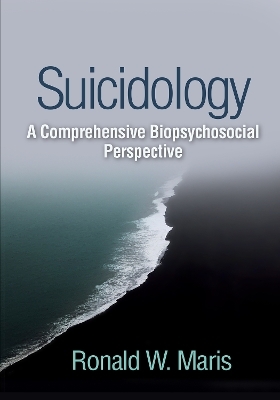
Suicidology
Guilford Press (Verlag)
978-1-4625-3698-6 (ISBN)
Ronald W. Maris, PhD, is Distinguished Professor Emeritus of Psychiatry, Family Medicine, and Sociology at the University of South Carolina (USC), where he directed the Center for the Study of Suicide for 15 years. He is a forensic suicidologist who offers investigation, consultation, and testimony on a variety of civil and criminal cases. Dr. Maris has written or edited 22 books and about 100 articles. He is past president of the American Association of Suicidology and a past editor of the journal Suicide and Life-Threatening Behavior. The recipient of four teaching awards from USC, Dr. Maris was certified in forensic suicidology by the American Association of Suicidology and earned Fellow status in the American Academy of Forensic Sciences. He has been invited to address the U.S. Congress on veteran suicides; was a consultant on the Columbia University/Food and Drug Administration project to analyze data on the relationship of suicidality and antidepressant treatment in children and adolescents, leading to black-box warnings; and has served as consultant and reviewer for grant applications to the National Institute of Mental Health, the American Foundation for Suicide Prevention, and the National Academy of Sciences.
Foreword, David A. Jobes
I. Foundations
1. Introduction to Suicidology
2. The Theoretical Construction of Suicidology
II. Data, Research, Assessment
3. Grounding Suicidology in Empirical Evidence
4. Risk Factors and Risk Assessment:Measurement
III. Sociodemographic Issues
5. Age, Lifespan, and Suicidal Careers
6. Sex, Gender, and Marital Status: A Phallocentric Focus
7. Social Relations, Work, and the Economy: Social versus Individual Facts
8. International Variation, Ethnicity, and Race in Suicide
9. Who Makes Suicide Attempts, How, and What Do Suicide Notes Say about Them?
IV. Major Mental Disorders, Biology, Neurobiology
10. Mental Disorder: The Most Important Suicide Risk Factor?
11. Major Depression: Undiagnosed and Untreated
12. Bipolar Disorder: A Suicidogenic Cycle of Despair
13. Schizophrenia: Bizarre and Psychotic Suicides
14. Personality Disorders: Borderline, Antisocial, and Obsessive–Compulsive Personalities
15. Alcoholism and Other Substance Abuse:The Second Most Important Suicide Risk Factor
16. Suicidal Biogenics of the Brain: Biology, Genetics, and Neurobiology
V. Religion, Culture, History, Ethics
17. God, the Afterlife, Religion, and Culture
18. Suicide in History and Art: How Did Suicide Evolve?
19. Ethical Issues, Euthanasia, and Rational Suicide: Is Suicide Ever the Right Thing to Do?
VI. Special Topics
20. Suicide in the Military: War, Aggression, and PTSD
21. Murder–Suicide: Why Take Someone with You?
22. Jail and Prison Suicides: Confinement, Rage, and Target Reduction
VII. Treatment and Prevention
23. Treatment and Intervention I. Pharmacology: What Are We Going to Do about Suicide?
24. Treatment and Intervention II. Psychotherapy: What Are We Going to do about Suicide?
25. Prevention: Can Suicides Be Stopped or Reduced?
26. Postvention and Survivors: Death May Solve the Suicide’s Problems, but What about Those Left Behind?
27. Forensic Suicidology: A Tort Is the Oldest Antidepressant
VIII. Summary and Conclusions
28. What Have We Learned?
References
| Erscheinungsdatum | 21.02.2019 |
|---|---|
| Verlagsort | New York |
| Sprache | englisch |
| Maße | 178 x 254 mm |
| Gewicht | 1148 g |
| Themenwelt | Geisteswissenschaften ► Psychologie |
| Medizin / Pharmazie ► Medizinische Fachgebiete ► Psychiatrie / Psychotherapie | |
| Medizin / Pharmazie ► Studium | |
| ISBN-10 | 1-4625-3698-0 / 1462536980 |
| ISBN-13 | 978-1-4625-3698-6 / 9781462536986 |
| Zustand | Neuware |
| Haben Sie eine Frage zum Produkt? |
aus dem Bereich


